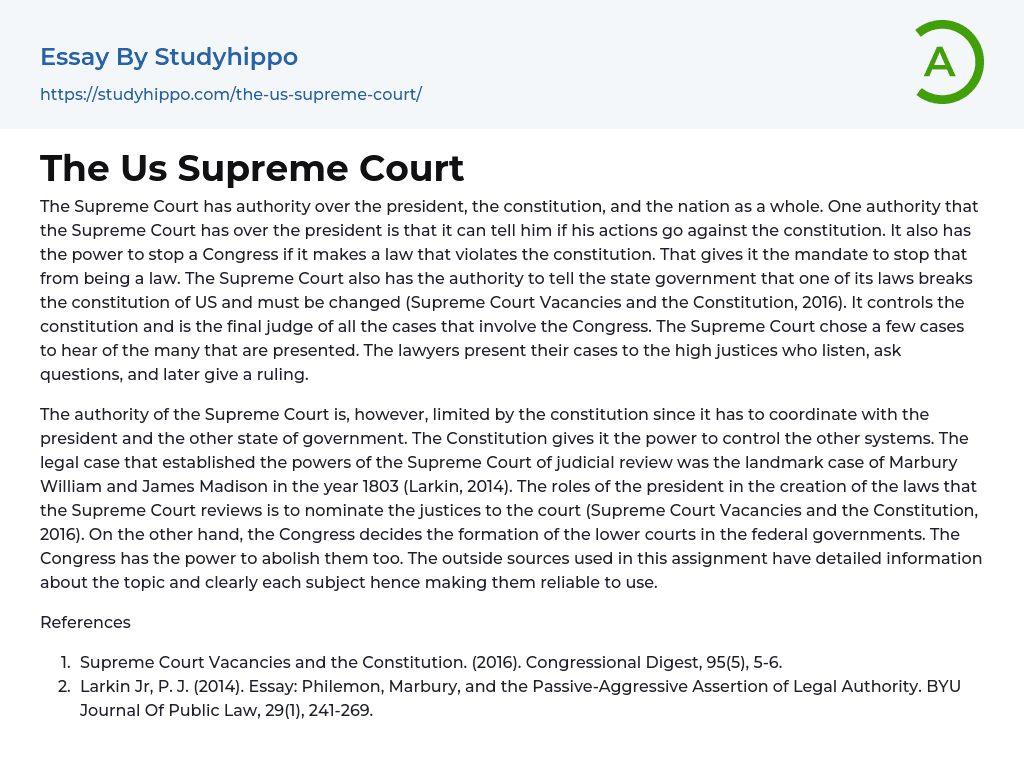The Supreme Court has authority over the president, the constitution, and the nation as a whole. One authority that the Supreme Court has over the president is that it can tell him if his actions go against the constitution. It also has the power to stop a Congress if it makes a law that violates the constitution. That gives it the mandate to stop that from being a law. The Supreme Court also has the authority to tell the state government that one of its laws breaks the constitution of US and must be changed (Supreme Court Vacancies and the Constitution, 2016). It controls the constitution and is the final judge of all the cases that involve the Congress. The Supreme Court chose a few cases to hear of the many that are presented. The lawyers present their cases to the high just
...ices who listen, ask questions, and later give a ruling.
The authority of the Supreme Court is, however, limited by the constitution since it has to coordinate with the president and the other state of government. The Constitution gives it the power to control the other systems. The legal case that established the powers of the Supreme Court of judicial review was the landmark case of Marbury William and James Madison in the year 1803 (Larkin, 2014). The roles of the president in the creation of the laws that the Supreme Court reviews is to nominate the justices to the court (Supreme Court Vacancies and the Constitution, 2016). On the other hand, the Congress decides the formation of the lower courts in the federal governments. The Congress has the power to abolish them too.
The outside sources used in this assignment have detailed information about the topic and clearly each subject hence making them reliable to use.
References
- Supreme Court Vacancies and the Constitution. (2016). Congressional Digest, 95(5), 5-6.
- Larkin Jr, P. J. (2014). Essay: Philemon, Marbury, and the Passive-Aggressive Assertion of Legal Authority. BYU Journal Of Public Law, 29(1), 241-269.
- First Amendment essays
- Bill Of Rights essays
- Civil Liberties essays
- First Amendment To The United States Constitution essays
- Fourth Amendment To The United States Constitution essays
- Second amendment essays
- Agreement essays
- Business Law essays
- Common Law essays
- Community Policing essays
- Constitution essays
- Consumer Protection essays
- Contract essays
- Contract Law essays
- Copyright Infringement essays
- Court essays
- Crime essays
- Criminal Law essays
- Employment Law essays
- Family Law essays
- Injustice essays
- Judge essays
- Jury essays
- Justice essays
- Lawsuit essays
- Lawyer essays
- Marijuana Legalization essays
- Ownership essays
- Police essays
- Property essays
- Protection essays
- Security essays
- Tort Law essays
- Treaty essays
- United States Constitution essays
- War on Drugs essays
- Abraham Lincoln essays
- Andrew Jackson essays
- Barack Obama essays
- Bill Clinton essays
- Donald Trump essays
- Franklin D. Roosevelt essays
- George W. Bush essays
- George Washington essays
- James Madison essays
- John F. Kennedy essays
- Lyndon B. Johnson essays
- Richard Nixon essays
- Theodore Roosevelt essays
- Thomas Jefferson essays




